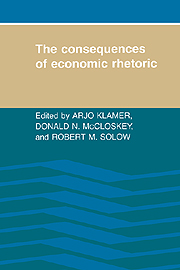Book contents
- Frontmatter
- Contents
- Preface
- The consequences of economic rhetoric
- PART I ECONOMIC RHETORIC: INTRODUCTION AND COMMENTS
- PART II ECONOMIC RHETORIC: FURTHER ARGUMENTS
- 5 Marxian theory and the rhetorics of economics
- 6 Economic rhetoric: The social and historical context
- 7 The ideas of economists
- 8 Should a scientist abstain from metaphor?
- PART III ECONOMIC RHETORIC AMONG ECONOMISTS
- PART IV ECONOMIC RHETORIC IN POLITICS AND JOURNALISM
- PART V ECONOMIC RHETORIC: ITS RHETORIC AND ITS CONSEQUENCES
- 1 Appendix: Other contributors and participants
- Index
6 - Economic rhetoric: The social and historical context
Published online by Cambridge University Press: 07 September 2010
- Frontmatter
- Contents
- Preface
- The consequences of economic rhetoric
- PART I ECONOMIC RHETORIC: INTRODUCTION AND COMMENTS
- PART II ECONOMIC RHETORIC: FURTHER ARGUMENTS
- 5 Marxian theory and the rhetorics of economics
- 6 Economic rhetoric: The social and historical context
- 7 The ideas of economists
- 8 Should a scientist abstain from metaphor?
- PART III ECONOMIC RHETORIC AMONG ECONOMISTS
- PART IV ECONOMIC RHETORIC IN POLITICS AND JOURNALISM
- PART V ECONOMIC RHETORIC: ITS RHETORIC AND ITS CONSEQUENCES
- 1 Appendix: Other contributors and participants
- Index
Summary
By comparison with the situation in literary studies, the discussion of economic rhetoric or discourse (the terms will be used interchangeably here) is still in its infancy. In this respect economics clearly lags behind other branches of science studies, which is hardly surprising, considering economists’ general lack of interest in cognate fields of inquiry and their manifest disdain for the history of their own discipline. Notwithstanding the pretensions of some of its proponents, it is still too early to judge whether the study of economic discourse will eventually grow up to become a mature research program with a recognized place and influence on its parent discipline. The preliminary results are promising, even exciting, and as budding research programs require nurturing, it is appropriate at this stage to focus on the constructive possibilities.
To the present writer this self-denying ordinance imposes severe constraints, for the Klamer/McCloskey (KM) agenda incorporates a number of negative features that constitute serious impediments to a balanced appraisal of its implications for an understanding of the development and functioning of economics as an academic discipline and a profession. The KM campaign is based on, and actively propagates, a currently fashionable radical epistemology (or antiepistemology) that directly conflicts with widely accepted views of the nature and purposes of the scientific enterprise. In particular, Mc- Closkey's exaggerated and misdirected attack on economic methodology (rather than the abuse of it) – in which he has lumped together and caricatured various intellectual positions under the blanket label “modernism” – is both “alarming” (as he intends) and confusing. He willfully blurs the distinction between familiar and useful categories, for instance, declaring, “Economics is a collection of literary forms, not a science.
- Type
- Chapter
- Information
- The Consequences of Economic Rhetoric , pp. 64 - 84Publisher: Cambridge University PressPrint publication year: 1989
- 2
- Cited by

